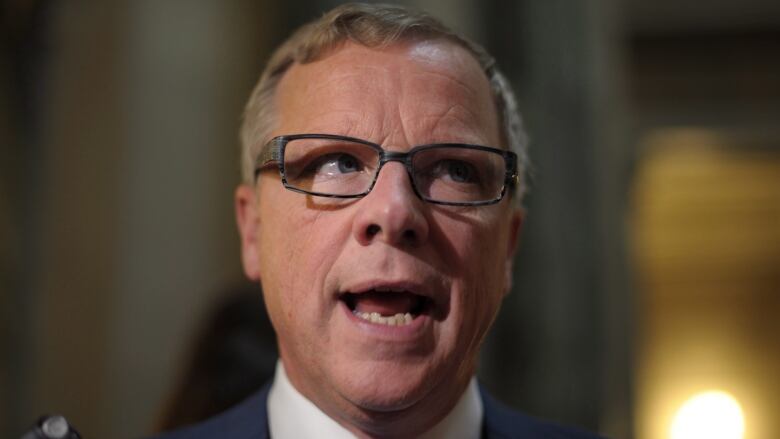Sask. premier not happy with federal government's response on carbon tax letter
Wall's letter says linking federal transfers to carbon tax policies would attack federal-provincial relations

Saskatchewan Premier Brad Wall said he is unsatisfied with the response he got back from the federal governmentregarding a letter he sent to the prime minister about carbon tax.
In his letter to Prime Minister Justin Trudeau, Wall said the idea of linking the money the federal government transfers to a province with their carbon tax policy would violate the principles of fiscal federalism.
The premier said he was alerted of the possibility when he found out memos obtained by an online publication showed the federal government intends to tie a province's stance on carbon tax to equalization renegotiations scheduled for 2019.
"That's no way to run a federation," Wall said. "We don't agree with the federal government on everything. We don't agree with them on the carbon tax, to be more specific, but that does not stop us in supporting the federal government in things like their engagement with the United States.
"There is an inference here that if you don't support the carbon tax, maybe you'll get less transfer dollars."
With his letter to the federal government, Wall said he was asking for clarity on the issue and a copy of the unredacted version of the memo.
Federal response
Minister of Environment and Climate Change Catherine McKennaresponded to the premier saying the issue of carbon tax is unrelated to equalization payments.
"Linking the two is not a conversation we are having with the provinces," she said in an official statement
McKenna also suggests the people of Saskatchewan should support the idea of carbon taxing.
"By putting a price on pollution we're showing that polluting is not free. And we're encouraging cleaner ways to do business and fostering innovation," she said. "Every penny of direct revenue from pricing pollution would go right back to the provinces.
"This would empower provinces like Saskatchewan to cut provincial taxes and support investment, jobs, innovation and growth."
After hearing from McKenna, Wall said he wasn't completely satisfied.
"We were seeking the assurance from the federal government that there will be no linkage between provincial carbon tax policies and federal transfer payments or any other type of federal payments to provinces, such as infrastructure funding," he said.
"I am pleased to hear the federal Environment Minister has provided this assurance with regard to equalization. However, her comments do not provide the full assurance we were seeking with regard to other types of federal payments, like infrastructure funding."
'Meet us in court'
Wall also said the Saskatchewan government will continue to "vigorously oppose" the idea of a carbon tax imposed by the federal government.
"If they think they have the constitutional authority to impose a carbon tax on one or a couple of provinces, then go ahead, bring it forward and we will take this to court," he said. "Meet us in court."
Trudeau has said all provinces must set up a cap-and-trade system or impose a price on carbon of at least $10 per tonne starting next year increasing to $50 by 2022 or Ottawa will do it for them.
Equalization is a program that transfers money from richer to poorer provinces so that they can offer government services at levels similar to elsewhere.
With files from The Canadian Press












_(720p).jpg)


 OFFICIAL HD MUSIC VIDEO.jpg)
.jpg)



























































































